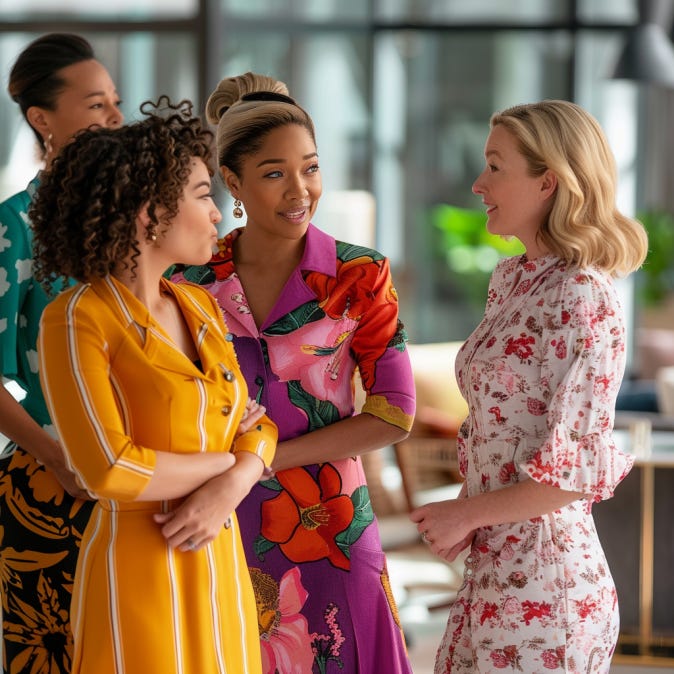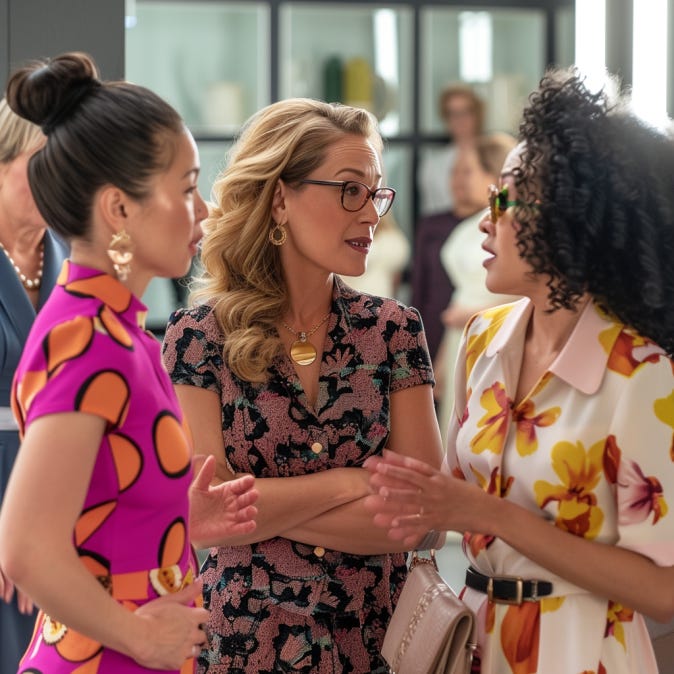Privilege: A View from Relative Privilege
Only when we address our discomfort with not fitting in can we actually get stuff done.




A decade ago I was invited to a dinner by another female founder known for both her enterprising and networking powers. She often hosted events for other women, supporting their books, companies or causes. When she asked me to join her and two other female founders for drinks after a panel we spoke on, I jumped at the chance to sit down with her and other women who had also been building companies.
I arrived to something much different than the intimate gathering of peers I expected: a much larger group of women, older and younger, were having animated conversations in pairs. Slow on the uptake, I gradually realized I was participating in a hiring speed dating event, and I was on the demand-side.
Our host kept the conversation lively, ensuring the younger women circulated quickly among the elder women. It had been a long day, but I put on my “paying attention” face and engaged each young woman introduced to me, dredging up as much pay-it-forward energy as I could muster.
The first conversation I had was similar to the ones that followed it: This young woman had just graduated from a top university but was not sure what she wanted to do. She had no immediate job plans. She would be traveling with her mother in Europe for the summer and would have more serious conversations about roles when she got back. She hardly seemed worried about her prospects: Whatever the plan, she would probably settle into a role by fall.
I thought about my own post-graduate plight 20 years prior, which was decidedly more fraught with uncertainty than that of this young woman. I had graduated a semester early from college, determined to get a jump on a publishing role and, orchestrating an inconclusive letter writing campaign from my parents’ home in the Chicago suburbs, moved to Manhattan to undertake my job hunt in person. I slept on friends' couches until I secured an entry-level role I would need to supplement with odd jobs to make rent on a room in a shared apartment.
I asked this young woman how she knew our co-host, and she explained: Her father, a prominent VC (not her words, but I was to extrapolate) was a friend of my friend, our host, who was (again, I was to extrapolate) doing this woman’s father a solid by offering his progeny fast-track introductions to people with hiring influence in the Valley.
Looking around the table at the other elders on the speed-dating tour there was a founder who in a few years would take her company public; another had built a commercial e-commerce darling originating from her own handmade designs; across from me was a prominent Silicon Valley executive recruiter who’d become known for sourcing some of the most consequential roles in high-growth companies and was a successful entrepreneur in her own right. Pure, uncut badassery.
I struggled to understand my ambivalence. On the one hand, I thought our host, my friend, was a master networker, generously spending her own social capital to give young women exposure to careers in tech. It was hardly her fault that she was so well-connected. Nor was it the fault of these young women that they came from so much privilege and were simply exploring the options presented to them.
Then why did I feel like I was in an episode of Bridgerton, playing the role of “suitor with prospects” to these youngsters who were not all that into the ball?
PREMIUM MEMBERS: The working world is changing dramatically, so all the systems that play into it have to change with it: hiring, networking, and mentoring.
Optionality’s Elisa Camahort Page deep dives into a new model for mentoring.
I’m hardly a babe in the woods when it comes to taking advantage of connections with influence and budget. I had been blessed with an internship in college obtained through a friend’s father, which later led to the a aforementioned first job post-graduation at a New York publishing house. Later, as an entrepreneur, I and my co-founders grew our startup leveraging four rounds of venture capital and corporate marketing budgets; a process fueled by the warm introductions of powerful friends of friends with check-writing capability.
Still, as someone who built a company around raising ALL women up and democratizing business models, the whole experience felt off-brand to me.
Even with the support of mighty powerful hook-ups I had to hustle, do the dirty work of entry-leveldom, learn the drill and do it over, and over, and over again with no fast pass to cut the line. I had to do the work, build my credibility, take my lumps with difficult managers, and pay with sweat equity for my seat at the this table. And even then I knew I had my share of lucky breaks.
In contrast, these young women, it felt to me, had been airdropped into the front row of the Taylor Swift concert of their careers, not even knowing the words of every song on Midnights by heart.
I wondered if maybe I was just feeling a twinge of irrational jealousy against these young women who could have been my daughters; I’m sure I was.
But honestly, if these ladies had been my daughters I suspect I would have made them research the companies and attendees before showing up that night, prepare speaking points around their qualifications, and write handwritten notes of thanks mailed promptly the next day. And I would have written one myself, thanking my host for the opportunities she provided my daughters, as my father did when I was afforded a lifetime opportunity of an internship at a prestigious publishing house. Even my Dad, who had he lived today would be squarely a populist and the farthest being ever from a helicopter parent, pulled out his best pen to thank some fancy elitist liberals for giving his daughter a shot.
You see, I was no Bridgerton.
If I related to anyone from the Netflix series it was Madame Delacroix, enterprising dressmaker to the upper crust, shop owner, watcher of the comings and goings of her clientele while not being too terribly attached to their personal lives or prospects, only if the dress fit and if they paid cash or credit. I knew where to tap money and influence, but I never confused that competency with any belief that having advantage meant losing one’s appreciation for it.
Maybe that’s what bugged me: The lack of awareness of the opportunity afforded these young women. And the dishonesty in not acknowledging this privilege.
This post by Luvvie Ajayi explains
“...your privileges aren't your FAULT but they are not to be left behind as you tell your story, otherwise you're not telling the full truth. Tell the whole truth."
The past week has afforded me many lessons in what acknowledging privilege looks like:
Real sponsorship: Let’s start with President Biden. Yes, stepping down from his bid for re-election and supporting his vice president was an act of patriotism. But it was also an act of acknowledgment of his privilege. He knew that even with the experience and competence VP Harris brought to the table, the moment required a senior white guy to open the door, and, with class, get out of the way.
Show up—with everyone: I attended the White Women: Answer the Call a virtual fundraising event for Kamala Harris, prompted by a call to action from serial make-things-happenite Shannon Watts. Despite all the Zoom outages and waiting for dropped speakers to get back on the call, it was electrifying.
My daughter asked me: Isn’t a call for white women kinda exclusionary? And I explained to her, in so many words: Actually no. It’s an acknowledgement that the only way to give white voting-age women — representing a third of the electorate, 55% of whom voted for Trump last election, versus 9% of black women — the kick in the tush they need to get Harris elected is by engaging other white women.
That said, all subgroups of white women showed up—younger, older, rich, not-rich, politicians, entertainers, and—in a category all by her damn self—PINK!—who participated in the call at 3am her local time, from a private jet. Glennon Doyle told us in no uncertain terms to prepare for the "shit show" opposition that was to be flung at Harris, and to get on our emotional hazmat suits to cover her. Prepare to get uncomfortable. Acknowledge that we—black, white, and brown—people are all involved in this fight, but with influence over other white women comes the responsibility to acknowledge this influence and to ACT.
Ask yourself: What would Melinda French Gates do? I realize this might open up some snarky responses: Spring for a $500 manicure? Skip the store brand at Whole Foods? Fly private?...
What I mean is: Assess what your privilege hath wrought and how it can be applied to those with less privilege. For Gates it meant allocating $1B toward advancing women’s power globally. To the unnamed angel Carrie Kerpen acknowledges in this post it means slipping a young woman a Post-It note with the salary she should be asking for in a job negotiation.
Put your mouth where your money is. Julie Castro Abrams writes about this in regard to supporting Vice President Harris in her election bid. My TLDR: Give money, yes, but don’t waste that money by not then actively advocating for your choice.
Rather than hosting $250k per plate dinners let’s do the unthinkable: Let’s call and ask our rich friends to give directly, without wearing ball gowns. And let’s invite our less-rich friends to join in with what they can. Better yet: Let’s put all our friends in a room together and have a massive potluck fundraiser. You bring the cupcakes and I’ll bring the sprinkles.
For the record, I love Bridgerton for the pretty gowns, orchestral versions of Ellie Goulding covers, and people who somehow know all the dance moves without missing a note. The show provides a model of a world where anyone can be virtuous or contemptible, which is democratizing. But it is still a society hampered by stratification defined by birth and marriage, if not by race. It’s uncomfortably imperfect, failing to acknowledge merit and character as a means of stature.
Let’s acknowledge all of it, and then get it done.





